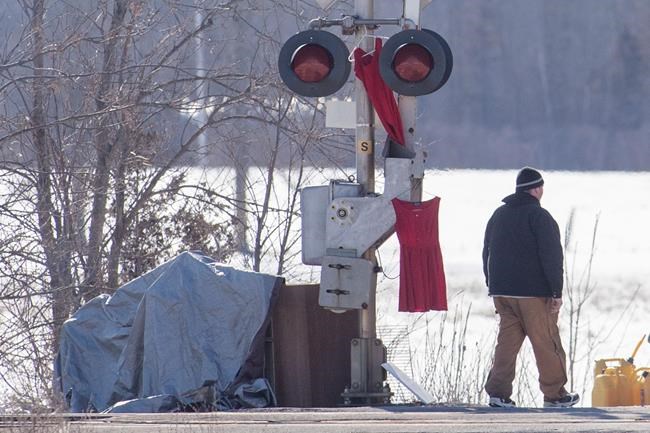A timeline on rail disruptions by anti-pipeline protesters across Canada
Advertisement
Read this article for free:
or
Already have an account? Log in here »
To continue reading, please subscribe:
Monthly Digital Subscription
$0 for the first 4 weeks*
- Enjoy unlimited reading on winnipegfreepress.com
- Read the E-Edition, our digital replica newspaper
- Access News Break, our award-winning app
- Play interactive puzzles
*No charge for 4 weeks then price increases to the regular rate of $19.00 plus GST every four weeks. Offer available to new and qualified returning subscribers only. Cancel any time.
Monthly Digital Subscription
$4.75/week*
- Enjoy unlimited reading on winnipegfreepress.com
- Read the E-Edition, our digital replica newspaper
- Access News Break, our award-winning app
- Play interactive puzzles
*Billed as $19 plus GST every four weeks. Cancel any time.
To continue reading, please subscribe:
Add Free Press access to your Brandon Sun subscription for only an additional
$1 for the first 4 weeks*
*Your next subscription payment will increase by $1.00 and you will be charged $16.99 plus GST for four weeks. After four weeks, your payment will increase to $23.99 plus GST every four weeks.
Read unlimited articles for free today:
or
Already have an account? Log in here »
Hey there, time traveller!
This article was published 17/02/2020 (2124 days ago), so information in it may no longer be current.
RCMP began enforcing an injunction earlier this month that prevents interference with construction of a $6.6-billion natural gas pipeline in northern British Columbia.
Here is a timeline of the dispute, along with rail disruptions by people showing solidarity with the hereditary Wet’suwet’en chiefs opposing the Coastal GasLink project:
Dec. 31, 2019 — The B.C. Supreme Court grants Coastal GasLink an injunction calling for the removal of any obstructions including cabins and gates on any roads, bridges or work sites the company has been authorized to use.

Jan. 1, 2020 — The Wet’suwet’en First Nation serves Coastal GasLink with an eviction notice, telling the company workers are “currently trespassing” on their unceded territory.
Jan. 27 — The British Columbia government appoints former New Democrat MP Nathan Cullen as a provincial liaison with Wet’suwet’en hereditary chiefs in the LNG pipeline dispute.
Jan. 30 — The hereditary chiefs of the Wet’suwet’en agree to seven days of meetings with the province.
Feb. 5 — The talks that were intended to de-escalate the dispute fail after just two days.
Feb. 6 — Protesters outside of Belleville, Ont., east of Toronto, start holding up railway traffic.
Feb. 7 — Via Rail halts service along one of its busiest routes because of the Belleville-area blockade. All travel between Toronto, Ottawa and Montreal is cancelled. Canadian National Railway obtains a court injunction to end a demonstration by members of the Tyendinaga Mohawk Territory near Belleville. Protesters also begin disruptions at ports in Vancouver and Delta, B.C.
Feb. 8 — Protesters in Toronto disrupt Canadian Pacific Railway traffic moving through the downtown.
Feb. 9 — Kahnawake Mohawk community members south of Montreal erect a blockade on a CP rail line.
Feb. 10 — Demonstrators in the Montreal area disrupt commuter train service on the Exo Candiac line. A shuttle bus service is in effect for affected rail stations.
Feb. 11 — CN stops transport between Prince George, B.C., and Prince Rupert, B.C., because of a blockade near Hazelton, B.C. The company says it has halted more than 150 freight trains since blockades started on Feb. 6.
Feb. 12 — The Manitoba government says it may seek a court injunction to end a blockade on a rail line west of Winnipeg, but CN obtains its own court order. The RCMP also formally end enforcement operations in a region of northern B.C. that’s at the centre of the pipeline dispute. Two hereditary Wet’suwet’en chiefs start a constitutional challenge of fossil fuel projects, as Prime Minister Justin Trudeau calls for demonstrators across the country to observe the rule of law.
Feb. 13 — CN shuts down its operations in Eastern Canada. The railway says blockades have ended in Manitoba and may come down soon in British Columbia, but the orders of a court in Ontario have yet to be enforced and continue to be ignored.
Feb. 14 — A rail blockade that halted train traffic to and from the Port of Prince Rupert is lifted as First Nations leaders agree to meet with federal and provincial politicians. A date for that sit-down is to be arranged. CN spokesman Jonathan Abecassis says the blockade was removed overnight.
Feb. 15 — Indigenous Services Minister Marc Miller says “modest progress” was made in talks with the Mohawk First Nation over a rail blockade that’s shut down train service across much of Eastern Canada. But Miller declined to say what progress was made after nine hours of meetings on Tyendinaga Mohawk territory near Belleville, Ont., saying he would deliver that message to Trudeau directly.
Feb. 16 — Trudeau cancels his planned trip to Barbados, less than 24 hours before his scheduled departure, so he can handle the protests in Canada. Meanwhile, protesters briefly shut down a busy Ontario border crossing.
Feb. 17 — Trudeau convenes the Incident Response Group, an emeregency committee that meets in the event of a national crisis.
This report by The Canadian Press was first published Feb. 17, 2020.





